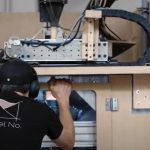
We take it for granted that everything and everyone is online these days, not stopping to consider that reality doesn’t quite meet that perception. Most companies have some sort of web presence, yes, but those that don’t run the risk of missing out on new customers or losing their connection to existing ones, particularly when those customers can no longer visit their physical location.
I recently spoke with Rayan Garg, the CEO of Project Falcon out of San Jose. Rayan started the company in March of last year as an outgrowth of his non-profit project, Elevate the Future. He has made it his and the company’s mission to aid small businesses in getting websites — a relatively simple thing that can make a huge difference in a world that’s more online in response to COVID-19. And despite his relative youth (he was going through AP testing at the time of the interview), his commitment to his cause is impressive.
Website creative plan development with drawn sketch in the design studio.
Mary Juetten: What problem are you solving?
Rayan Garg: As the coronavirus forced closures to stop the spread of the disease, the world had come to a standstill. Businesses around the country had been forced to shutter their entire physical storefronts. And, for those businesses without a website or digital presence, it meant losing access to their customers entirely.
Since the start of the pandemic, over 100,000 small businesses have permanently closed. With small businesses accounting for half of our workforce, that’s disastrous for both people’s livelihoods and the economy. Despite being forced to shutter their entire storefronts, over 40% of small businesses still don’t have websites.
A countless number of business owners lack both the financial ability to transition their businesses online and the technical skills necessary. In addition, most business owners don’t have time to focus on developing a digital presence, especially when they aren’t aware of the benefits a digital presence can bring. Project Falcon was created to help these business owners around the country.
MORE FOR YOU
Juetten: Who are your customers and how do you find them?
Garg: Our customers are small businesses owners who currently lack a digital presence and are interested in developing a new website. Our primary way of finding these small businesses is working with government agencies and other nonprofits who cater to these small businesses. Through means such as city webinars, partnerships with cities, and outreach through other nonprofits that work with small businesses, we have been able to reach a wide variety of small businesses. Just last week, after being published in the Hello Alice newsletter, we had 40 small businesses sign up to go through our program over the next few months.
Juetten: If you are delivering a non-profit or legal service, please tell us more.
Garg: Project Falcon initially provided websites designed by students who had gone through the website classes of the nonprofit, Elevate the Future. Elevate the Future is a nonprofit I had started that is focused on increasing the access to business and computer science education. My ‘why’ for starting Elevate the Future is twofold: firstly that, throughout middle and high school I personally experienced the value of education and having engaging educators, and secondly that, I personally enjoy entrepreneurship and computer science and both of these fields are becoming more prominent.
Juetten: How did past projects and/or experience help with this new project?
Garg: The primary experience that has helped me with running Elevate the Future and Project Falcon has been my experience working with my school’s business club. In my sophomore year of high school, I founded my high school’s business club. This was my first major leadership experience and it was transformational. I learned how to work with a set of administrators, how to organize events and activities for a large set of people, and how to adapt on the spot. In addition, through both the club and business competitions I attended, I gained experience pitching to a room of adults, many of whom had intimidating amounts of experience. All of this has been really helpful with Project Falcon, where I have had to use these skills on a daily basis.
Juetten: Who is on your team?
Garg: The Project Falcon team is composed of over 20 high school volunteers from around the world, all of whom are interested in using their skills to make a positive difference in the world. My team also includes my co-founder Arjun Gupta, who has been foundational to the organization. Both of us lead the organization together, and without Arjun, the organization wouldn’t be where it is today.
Juetten: Did you raise money?
Garg: Over the past year we have raised money through both donations and grants from government agencies and other organizations, such as our local City of Cupertino, Safeway, and the National Center for Women in Technology.
Juetten: Startups are an adventure — what’s your favorite startup story?
Garg: My favorite startup story is that of Airbnb. Hearing their story on the How I Built It podcast was inspirational, and really shows the importance of perseverance in the startup world. Even though they had many points at which they could have chosen to give up, they didn’t, and that’s why Airbnb has reached where it is today. I believe their story also stresses the importance of directly talking to your customers. It wasn’t until they flew out to New York and talked to their customers that they realized the problems that existed with their platform and the improvements they needed to make.
Juetten: How do you measure success and what is your favorite success story?
Garg: As Project Falcon is focused on helping small businesses, one of the primary ways I measure success is based on the number of small businesses we have helped. With each of the projects I work on, I also like to set smaller goals or checkpoints that I want to achieve, as it helps me break down how I plan to achieve the larger goals I have set.
My favorite success story is one of the small businesses we have helped. I remember the other day, when we were on a call with a restaurant owner for whom we had developed a website, and he just opened up to us and started recounting the struggles he faced at a young age. Not only did he have to struggle with the death of his mother, but he also had to survive the foster care system, where he was constantly treated as worthless and nothing more than a check. His only escape became cooking, and today it’s his livelihood. With the start of the pandemic, having a digital presence became more important than ever for his business. And seeing him having the ability to reach far more customers in a much more efficient way with a new website has been amazing.
Juetten: Any tips to add for early-stage founders or CEOs in growth mode?
Garg: Don’t be afraid to ask for help. Initially, I was worried that being an organization completely run by high schoolers would mean people wouldn’t be willing to help to believe in our mission. Instead, I found that schools and organizations were open to dialogue and were willing to give us a shot. I realized this as I tried to find speakers for the digital summit our organization was planning to host. Unsure how to start, I just began cold messaging people on LinkedIn. Although some didn’t respond, quite a few people actually did and ended up speaking to our students, such as an executive partner at IBM and the person who used to manage all of Cisco’s global media partnerships. I am truly appreciative and thankful to all of them – their effort and time makes an impact on the next generation in America.
Juetten: What’s the long-term vision for your company?
Garg: Until now, a majority of small businesses we have helped are located in the Bay Area. While we want to continue to help the small businesses in the Bay Area community, we also want to expand beyond the Bay Area to help small businesses around the country. In the long term, we also want to develop a program to help small businesses in developing countries, who lack the access to resources we often take for granted.
Thanks to Rayan for sharing his story with me. A website can seem trivial, but it’s a vital resource for every business to have today, and who better to help than the generation that grew up on the internet? If any other nonprofits that work with small businesses need website help, please reach out on LinkedIn to me or Rayan directly. #onwards.







